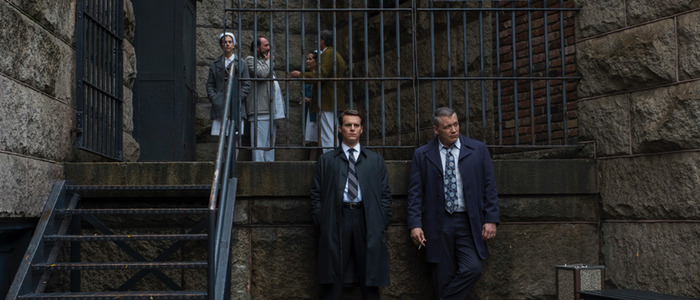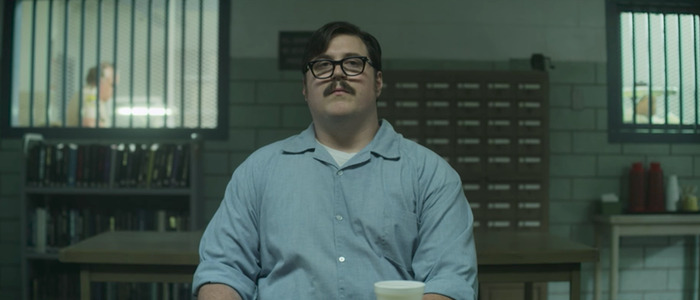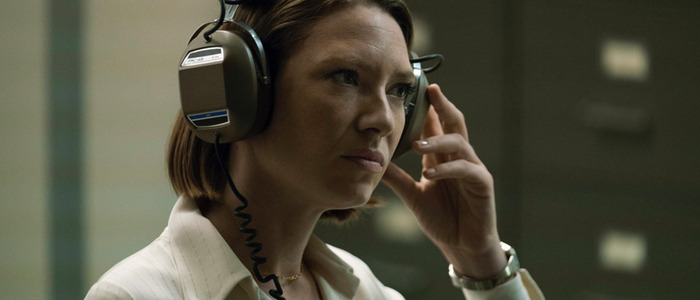'Mindhunter' Spoiler Review: A Deep Dive Into David Fincher's New Netflix Series
(In our Spoiler Reviews, we take a deep dive into a new release and get to the heart of what makes it tick...and every story point is up for discussion. In this entry: Netflix's new serial killer drama Mindhunter.)"The evil that men do lives after them; the good is oft interred with their bones." -William Shakespeare, Julius Caesar
The term "serial killer" is a relatively new invention. Yes, people have committed multiple murderers throughout history, but no one began to really classify, or even begin to try to understand, these types of violent crimes until the the 1970s. You may not be familiar with the name John Douglas, but I guarantee you are familiar with his work. From Douglas sprang the very concept of criminal profiling. His work has served as the inspiration for a steady stream of movies and TV shows. The character of FBI agent Jack Crawford, played most prominently by Scott Glenn in The Silence of the Lambs and Laurence Fishburne on the TV series Hannibal, was based directly on Douglas.
Now, the early days of Douglas' career are given the full dramatization treatment with Mindhunter, a new Netflix series created by playwright Joe Penhall, with David Fincher and Charlize Theron both serving as executive producers. With Mindhunter, Netflix has produced their best show in recent memory, and arguably one of the best shows in their ever-growing catalogue.
A New Breed of Killer
While showrunners have recently fallen back on the pithy response that they treat their shows as series-length films, this concept applies quite nicely to Mindhunter. Whether or not you think that's a good thing depends on you. If you're looking for something with episodes that stand alone, Mindhunter is not for you. This is a heavily serialized show, with each episode informing the next; each moment serving as one piece in an ever-expanding puzzle. It is to Mindhunter's credit that the show's writers find a way to make all of this come together quite nicely without the series ever feeling as if it's spinning its wheels. Most (in fact, almost all) Netflix series have a tendency to overstay their welcome. Mindhunter is the first Netflix show in recent memory that I actually wanted much more of.
At the center of Mindhunter is Special Agent Holden Ford, our fictional stand-in for John Douglas. As played by Hamilton's Jonathan Groff, Ford is one of the most refreshing main characters of a police/FBI procedural show in recent memory for one main reason: he's kind of a dork. For decades now, films and TV series that focus on law enforcement have saw fit to give us the tough, troubled main character. He's usually grizzled, and hard drinking, and kind of a dick to everyone he encounters, but gosh darn it, he gets the job done.That's not the case with Mindhunter. Holden Ford is an idealistic dweeb; a straight-laced guy who parts his hair the same way every day and wears a suit even when he's off duty. He's naive in some ways, but not so much so that he seems clueless. Instead, he just seems like an ordinary, even slightly boring guy.When we first meet Holden, he's trying to disarm a hostage situation using the time-honored techniques the FBI has taught him. It doesn't go well – the hostage taker blows his own head off. No hostages die, but the situation leaves Holden rattled, feeling as if the work he's doing as a hostage negotiator is useless. It's 1977, and David Berkowitz, AKA the Son of Sam, has just been apprehended. It's the dawn of a new breed of killer; a killer whose motives aren't entirely understood by the FBI. The bureau is used to dealing with murderers who kill in fits of jealous rage, or for profit. Murderers like Berkowitz seem to be driven by compulsion.Holden wants to dig deeper. He wants to start trying to understand what could create the type of killer like Son of Sam. Berkowitz may be the latest multiple murderer caught, but he's definitely not the first. What's driving these men? Is it the shift in culture? The aftermath of the Vietnam War? The aftermath of Watergate? There's been a seismic shift in the country, and the world seems to no longer make sense.
This curiosity about killers leads Holden to Bill Tench (Holt McCallany), a member of the FBI's Behavioral Science unit. The two strike up a friendship that leads them out on the road to help educate local law enforcement about the FBI's tactics. These road trips give Holden an idea: he wants to start going to prisons across the country and interviewing murderers. The idea seems ludicrous to Holden's FBI superiors. Their job is to lock these criminals up, not get to know them. But Holden believes that there's a fountain of untapped potential here; that perhaps if they could study and understand what drives these multiple murderers that they may be able to prevent future crimes.
The Avengers of Serial Killer Thrillers
The first episode of Mindhunter is all set-up; perhaps too much set-up. We see Holden and Tench growing closer while also remaining slightly adversarial. We see Holden hook up with Debbie (Hannah Gross), a sociology student who will become his girlfriend. It's all handled with care, directed impeccably by Fincher, who directs four of the ten episodes of the season. The series has the same shadow sodium lighting so prominent in Fincher's masterpiece Zodiac, a look and feeling that other directors pick up for the show even when Fincher isn't involved.Mindhunter truly comes to life in episode two, where it reveals what kind of show it really wants to be. In this episode, Holden sits down with his first serial killer (although again, remember: that term hasn't been invented yet in the timeline of the series). That killer is Ed Kemper, and the character, and his portrayal, is really unlike any onscreen serial killer you've seen before. As played by Cameron Britton in a star-making performance, Kemper is jovial and knowledgeable. From his deliberate way of speaking to the way he simply carries himself from moment to moment, Britton's performance is so out-of-nowhere great that I'll be shocked if this doesn't lead to him getting a ton of offers for bigger parts.Towering well over six feet, he should seem threatening, but Britton's performance disarms both the viewer and Holden. All-in-all, Ed seems, outwardly at least, to be a nice guy. But he's not a nice guy. He's a monster. He's murdered multiple women, including his own mother, and had sex with the corpses of his victims. Kemper spent much of his youth in a mental institution after murdering his grandparents, and he used this time to learn how to easily manipulate people. He was able to convince his doctors that he was no longer a danger to society, and then became a serial killer. Holden's interviews with Ed are revealing, and give him his first real insight into the mind of a murderer. But is Ed just gaming the system again, and telling Holden what he wants to hear? Or is he so desperate to talk to someone that he's being forthright?Eventually Tench gets involved with the interviews and from this springs the beginnings of criminal profiling. Holden and Tench begin interviewing more killers, including the notorious Richard Speck (Jack Erdie), who killed several nurses in one long, blood-drenched night, and Jerry Brudos (Happy Anderson, suitably creepy), a fetishist who took photos of himself with his victims yet still denies his guilt. All the killers that Mindhunter features are real, and there are times when the show feels like a morbid serial killer themed version of The Avengers, slowly assembling the worst of the worst over a season. You might find yourself wondering when Holden and Tench will find their way to even more famous killers, like Charles Manson (who is mentioned several times but never makes an appearance), and Ted Bundy, who isn't even a blip on Holden and Tench's radar but who is somewhere out there killing during the events of the show.As Holden and Tench travel from town to town, interviewing killers and teaching law enforcement, they find themselves drawn into local cases. These scenarios are among the weaker elements of Mindhunter. One gets the sense that the producers felt the show needed a more procedural Law and Order type feel, and thus insisted there be more episodic cases for Holden and Tench to investigate. These elements are handled fine, and one case that involves an entire family guilty of covering up a murder is harrowing. But they're not nearly as interesting as the moments Holden and Tench spend speaking with serial killers and learning what makes them tick.After Holden and Tench's criminal profiling begins to expand to include more resources, Anna Torv enters as Dr. Wendy Carr, a psychologist who is among one of the first people to see how important criminal profiling can be. There's a lot of potential for this character, who seems at times to be the moral conscience of the unit, but Mindhunter sadly never finds a way to give Dr. Carr enough to do. Torv is excellent in the role, and hopefully future seasons will expand her character. But brief glimpses into Dr. Carr's life, where she continuously feeds a stray cat in her apartment building's laundry room, amount to very little.
Comedy of Terrors
Tone can be a difficult thing when creating a serial killer drama. Serial killers as a whole have become mythologized, and, to an extent, glorified. There are even serial killer trading cards. Obsession with these individuals have turned them into something akin to folk heroes and people engaging in this behavior are playing a very dangerous game. These men are not heroes in any stretch of the imagination; they're destructive individuals who do terrible, unspeakable things to women. That theme is at the heart of the show: the ever-present danger to women at the hands of monstrous men. Mindhunter continuously walks a tightrope in this regard, yet makes it look incredibly easy. The show finds a way to not sympathize with its murderers while also taking the time to show us what makes them tick. We may never understand why these men do terrible things, but we may at least have a better understanding of how they rationalize their crimes to themselves.Speaking of tone, Mindhunter is surprisingly funny. Ads for the show have gone in hard selling it as a dark and scary serial killer drama, and it can be that. But there's a remarkable amount of humor at work here, and thank god. The humor helps keep the series from being a joyless exercise in misery. The jokes are never at the expense of the crimes, but rather a counter-balance to them. There's a gallows humor at work here; a sense that the characters often know the conversations they're having with serial killers are bordering on the absurd. A lot of the humor is situational, coming as the result of a reaction shots or quick reveals. Time and time again, one can't help but come back to Fincher's Zodiac, which also employed humor, although not as frequently as Mindhunter.Yet the humor isn't constant. Indeed, the earlier episodes are chock-full of funny moments, yet as Mindhunter continues on, the jokes dry up, giving way to a coldness that may catch several people off guard just as much as the earlier, humorous moments. While Holden begins the show as a bit of an idealistic dweeb, as Mindhunter progresses, his hubris begins to get in the way. As he grows more confident in his abilities to get inside the heads of killers, he becomes more and more daring and confrontational. He learns to speak the same sort of language as the killers he's interviewing, which may land him in hot water. He also starts applying his knowledge outside of work, and focusing it on people who haven't technically committed a crime yet.
There's murky ground here. The whole point of criminal profiling, at least according to Holden, is to prevent future crimes. Yet if you employ these techniques on individuals who haven't broken the law yet, are you tripping down the path of persecution rather than prosecution? This conundrum presents itself when Holden begins looking into a grade school principal who has an unhealthy obsession with tickling the feet of his students. Here in 2017, the very thought of a stranger touching our children in any sort of way sends up a red flag, but in the 1970s that Holden works and lives in, there are some who can't quite see the harm in the principal's actions. Surely tickling someone is not the same as sexually abusing them, argue people around Holden.
But the FBI agent just can't help shake the feeling that there's something off here, and the potential for the situation to turn into something worse. He acts on his instinct, and those actions have unexpected consequences, which only lead to more uncomfortable questions. "Who are you, the thought police?" Holden's supervisor asks. Holden's work begins to bleed over into whatever personal life he has, affecting his relationship with Debbie. Like Dr. Carr, Mindhunter doesn't seem to entirely know what to do with Debbie as a character, and that's unfortunate, because Hannah Gross' performance is fiery and compelling. We want more of her. A lot more.Groff is excellent at playing Holden's slow arc from well-meaning nerd to arrogant prick. It's a subtle transition, one you don't entirely see coming until it's too late. It's fascinating to watch an actor transform so slowly yet thoroughly over the course of ten episodes, and the strength of the performance lies within how methodically yet carefully Groff approaches the change.Then there's Holt McCallany as Holden's partner Bill Tench. McCallany is one of those dependable character actors who pops up from time to time; the type of actor you see in something and exclaim, "Hey, it's that guy!" Mindhunter gives McCallany one of his biggest, most prominent roles, and the actor doesn't waste it. Tench is the strong, silent type, at least at first. But as Mindhunter progresses, the show chips away at the character's rough veneer and peers into his bruised soul, dealing with a strained marriage and his adopted son who may have Autism. None of this is presented in broad strokes, but in quiet, low-key moments with occasional outbursts. McCallany handles it all superbly, particularly a moment where he blows up at his wife only to quietly apologize repeatedly, all as the camera lingers on his face, a chunk of granite slowly eroding away.Mindhunter is a series of limitless potential simply due to the tragic fact that serial killers will always exist. The show may start in the '70s, but it can continue to stretch onwards, well into modern times. At the start of several episodes, we get a glimpse of a mysterious man (Sonny Valicenti), methodically assembling things he needs to commit murder. Mindhunter never tells us just who this individual is, but anyone familiar with serial killers will be able to pick up on the fact that this is supposed to be Dennis Rader – the BTK Killer, a serial killer whose crimes began in the 1970s and didn't come to an end till 1991. And even then, Rader wasn't apprehended until 2005. For over 30 years, the BTK Killer was out there, hiding in plain sight. That's the truly frightening element of Mindhunter – serial killers like Rader are out there, right now, waiting, and planning. In the final interview before his execution, serial killer Ted Bundy warned, "We are your sons and we are your husbands." Monstrous men like this will always exist. The only comfort we can take is in hoping there were always be individuals, like the characters of Mindhunter, working to stop them.



